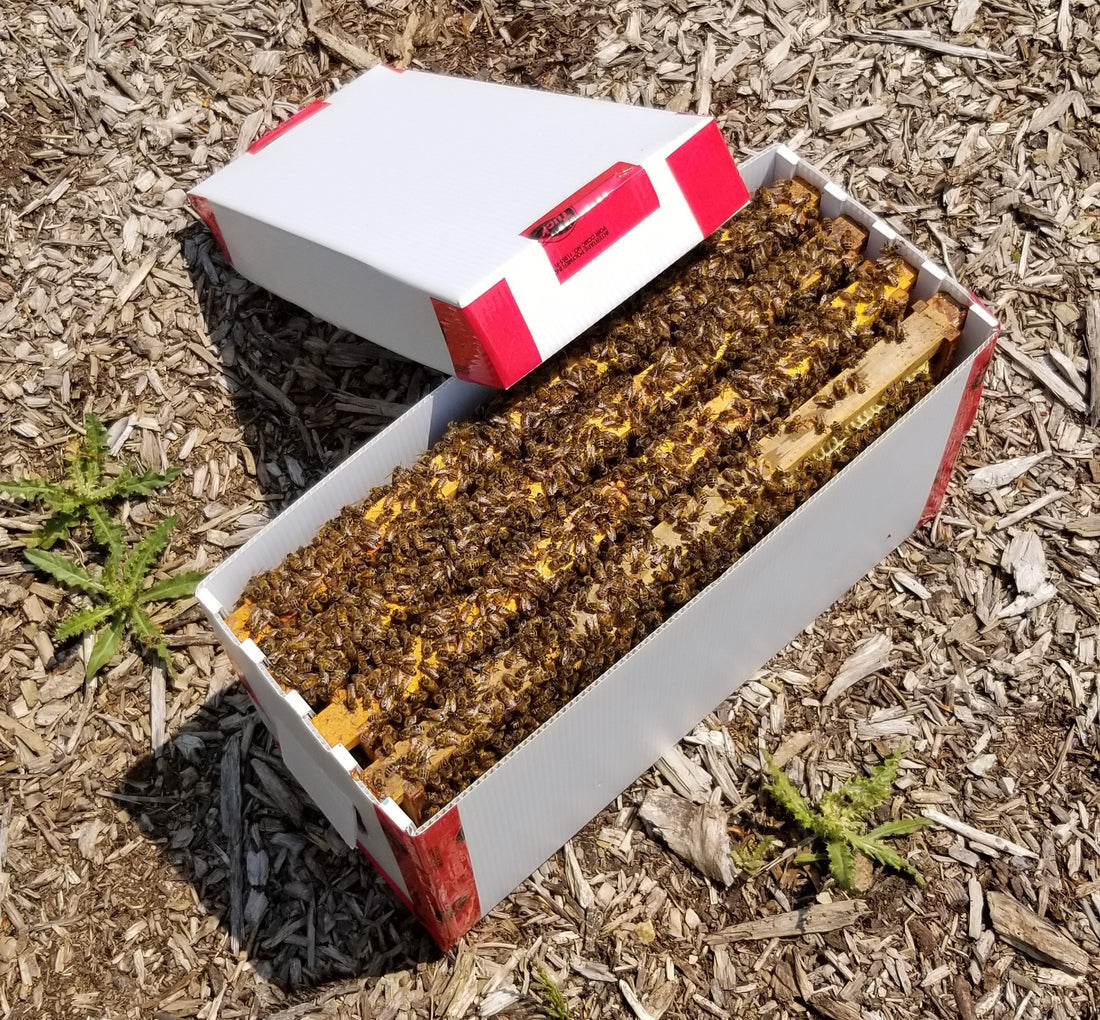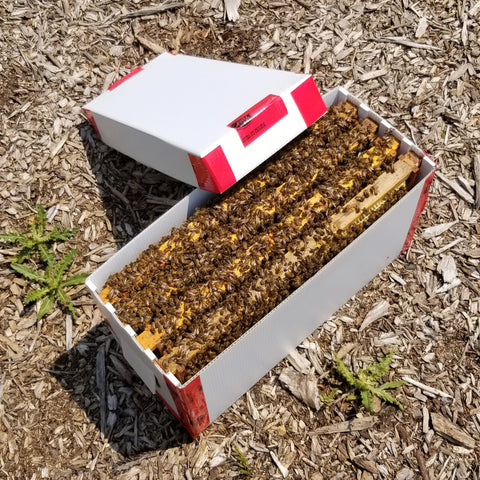
Are You Buying Nucs this Spring?
Here's what you should know about buying bees in Ontario, before you buy bees in Ontario! What is a nuc? What things should you think about and consider asking your local bee breeder? Read on to learn some tips about what you might want to know.
What is a nuc?
A ‘nuc’, or nucleus colony of bees, is the most common way to purchase a hive of honey bees. A nuc generally consists of a queen, 2 or more frames of brood, a frame of feed and an empty frame or frame of foundation that gives the bees space to cluster. A nuc can vary in the total number of frames (brood, feed and empty), the age of the queen and the type of shipping box. Ontario nucs are most often sold with 4 frames in an enclosed, easily transportable box.

The Ontario Bee Breeders Association's (OBBA) standard for a 4 frame nuc is as follows:
• Queen bee
• 2 frames of brood, ½ to ⅔ capped, with adhering bees
• 1 frame of feed with adhering bees
• 1 frame of foundation/empty comb
• Extra bees to ensure the brood will be kept warm
This is also the standard for nucs here at Huckleberry Hives. A good nuc, when made up with approximately ½ to ⅔ of the brood capped, should produce some surplus honey that you can harvest in an average year if it is established on drawn comb. Be aware that if there is a delay in pick-up or installation, the capped brood may begin to hatch. Additionally, if you aren't able to provide drawn comb for the bees, they will consume 8LBS of honey per 1LB of wax made while drawing out the comb, so they will likely need all of their honey themselves. You can help mitigate this by feeding 1:1 sugar syrup to your new hive to help supply them with energy for wax building.
Another important question to ask:
How old is the queen? Is the queen Ontario stock?
A really early season nuc may have a queen mated the previous summer; ideally the daughter of a queen selected for traits such as hygienic behavior, honey production and bred for local conditions. Later in the season nucs are made with queens produced in the same season. Alternatively, be aware that some bee breeders sell nucs with queens brought in from other countries, and this is especially common of early season nucs even when purchasing from some of the breeders who are part of the Ontario Resistant Honey Bee Selection (ORHBS) program (I know this based on several purchases of my own from various ORHBS breeders). Thus, if you are looking for stock specifically from a local breeding program, don't be afraid to ask about this and be prepared to wait longer and expect to pick up your nuc(s) later in the season (usually June). Here at Huckleberry Hives we are in year 4 of establishing a formal breeding program and I mark my queens using the international colour system to ensure that I know how old your queen is. I also aim to only sell my own queens from my breeding program. Queens that are imported are tested out for a year of performance assessment before I use them in my breeding program, and I don't sell nucs with imported queens.
Is it a spring nuc or a summer nuc?
A spring nuc is available throughout the month of May into early June and will often consist of an overwintered queen on her own brood. In this respect, the queen has already proven to be a good layer and has survived her first winter with no problems. A summer nuc is one sold mid-June and after and will generally have a newly mated queen, possibly boosted with brood from other hives. A summer nuc will likely not produce enough honey for you to harvest in it's first year. If you are interested in knowing more about the age of your queen, don't hesitate to ask your bee breeder!
What is the cost of a nuc?
Huckleberry Hives was a member of the Ontario Resistant Honey Bee Selection (ORHBS) program from 2019 to 2023 to ensure that Huckleberry Hives' stock has a good base of hygiene (disease resistance), overwintering and gentleness. Beginning in 2024 I am switching to performing my own hygiene testing via pin-kill assay + low varroa growth testing. New queens are only produced from hives that show good results in hygiene testing as well as have good overwintering success. This leads to higher quality in our nucs and queens and is reflected in the price, which you can expect to be adjusted annually to account for costs associated with scientific testing and inflation. Think about it: would you pay more for a spring nuc made up of random brood and an imported queen that is not acclimatized to our environment, or would you prefer to know your queen is coming from known stock acclimatized to our environment? You'll see various pricing for nucs depending on the bees' origins and on the individual business operation. Expect to pay more for bees of a specific race (i.e. Buckfast) or from a local breeding program.
Additionally, there are costs to beekeeping outside of just the purchase of a nuc. Consider equipment costs and even more importantly, knowledge costs - you NEED to know about varroa mites and how to manage and monitor hive health!!! If you don't take the time to educate yourself about the myriad of pests and diseases (including the varroa mite) that beehives face here in Ontario, you may be setting yourself up for losing your hive over winter.
What tells me someone is approved to sell bees by the Ontario Ministy of Agriculture, Food and Rural Affairs?
Any beekeeper selling queens and nucs is required to have a Queen and Nuc Permit from the Ontario Ministry of Agriculture, Food and Rural Affairs (OMAFRA). This ensures that your queen and nuc producer is regularly inspected and is not spreading diseases such as American Foulbrood and is managing their hives' varroa mite levels. The nuc box or paperwork should have an attached Queen and Nuc permit, or you can ask your nuc seller for a copy and they are required to give it to you.
All first time beekeepers are encouraged to take at least one hands-on workshop before jumping in to beekeeping. Workshops are offered by the OBA Tech-Transfer Program, the University of Guelph, as well as experienced beekeepers within the Ontario bee industry. Huckleberry Hives currently does not have any educational workshop dates set for 2024. I strongly recommend the Tech Transfer Program workshops, as they are the most up-to-date option within Ontario. Additionally, it can be very educational to work with other beekeepers before jumping into the expenses and adventure of beekeeping - to that end, try attending a local bee club meeting and see if you can visit someone else's hives!
And there you have it. Happy bee shopping! Please consider planting some flowers and taking some educational courses from reputable Ontario educators before jumping into beekeeping.
Last Updated: January 2024
